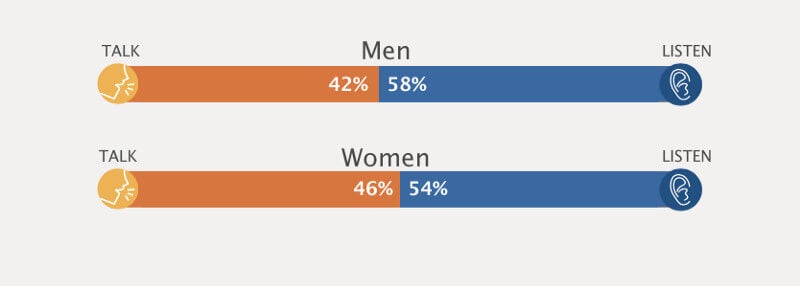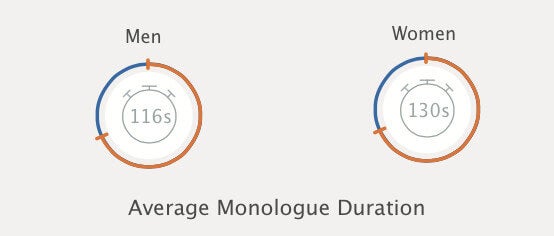Empowering women in the sales industry
It’s rare that I can go a full week without seeing women in sales come up on social media.
And rightly so. We need more women in sales. Especially in the male-dominated tech world.
The “hotness” of this topic has provoked a new discussion among some opinionated people: Who sells better? Men or women?
Unveiling Gender Differences in Sales
And so far, opinions (rather than science or data) have won the day.
An article I read a few weeks ago made the claim that “women sell better than men” and that “women are the more evolved sex in every way.”
The only data to back up these claims were the author’s list of 12 “reasons” he thinks women are better than men.
So, when the team and I at Gong decided to use AI to analyze the sales calls of men and women to uncover differences in how each gender sells, I couldn’t wait to bring science to this topic.
But boy, was I in for some surprises.
How We Got This Data about Women In Sales
Before I jump into the results, let me outline how we did this.
30,469 B2B sales calls were recorded, speaker-separated, transcribed, and analyzed using Gong’s self-learning conversation analytics engine.

While the data set was slightly skewed toward men (17,977 calls for men, 12,492 for women), statistical significance was still achieved on both sides.
All of the calls that were analyzed were pulled from companies that are similar to each other — same industry, similar sales cycle duration, and deal sizes, etc.
While we couldn’t guarantee all of the sales reps had similar backgrounds and experience, the analysis was done on fully on-boarded reps rather than new sellers.
Here are the patterns we’ve found (so far, stay tuned for more).
Who “Listens” Better: Men or Women In Sales?
If you look at the data, you’d conclude that men listen better than women in sales.
Men, on average had a 42:58 talk-to-listen ratio, while women averaged 46:54.

Not a huge difference. But wait, there’s more. . .
Men interrupt their prospect 4.2x per hour. Women? 6.3x per hour – about 50% more than men.

Men also pause before responding longer than women on average: 1.5 seconds vs. 1.3 seconds.
And finally, women in sales tend to go on “monologues” longer (and more often) than men do. By “monologue,” I mean an uninterrupted streak of talking without the customer chiming in.
When men go off on a monologue, they average 116 seconds. Women average 130 seconds.

If you’ve spent much time in sales, you’d start to think that men are the better salespeople after looking at this data.
Which is why the next data points are a bit brain-wracking…
Despite These “Broken Rules,” Women In Sales Close More Deals
Even though the above data paints women as lousy listeners, women progress deals to the next opportunity stage at a higher rate than men do.
They also close deals at a higher and faster rate than men.
In our dataset, men had a 49% likelihood of moving opportunities to the next stage, while women boasted 54%.

And women’s win-rates were 11% higher than men’s (on average).

Let’s Unpack What This Could Mean
Now that I just data-dumped you, let’s unpack this.
Science consists of both the quantitative (data), and qualitative aspects of a problem. One without the other doesn’t tell the full story.
In this case, the quantitative side of the story is looking at sales conversation analytics.
The qualitative side of the story is listening to sales call recordings or observing them live to investigate what’s actually going on.
How Are Women In Sales Breaking Some of the Traditional Rules, Yet Still Closing More Deals?
Despite the fact that the data paints men as better listeners than women, for all we know, men could be twiddling their thumbs, thinking about something else while they’re supposed to be listening to their customer.
Silence is not the same thing as listening.
Rambling Versus Persuading
Tonni Bennett, VP Sales at Terminus had an interesting observation. She provided an example that highlights how quantitative data tells half of the story. It’s important to also understand the quality of sales calls.
She once had two reps that both talked too much on calls: a male and a female.
When the male talked too much, he rambled on in a way that derailed the conversation and hurt his credibility. He would often answer simple “yes/no questions” with a long-winded response that sparked more questions from the prospect.
Even though the woman also talked too much, she was usually making strong selling points or sharing a customer story instead of rambling.
Women In Sales Don’t “Toss Nerf Balls Around the Office”
Another female sales leader I know made the point that she often sees men tossing around nerf balls while on the phone with their customers.
How often do you see women in sales roles doing something like that?
She argued that while men are talking less (and thereby assumed to be listening more), they are often in another world – while women are focused on their customer intently – talking or listening.
Tell Me What You Think
That’s all the data I have (for now). Help me unpack this. What are your explanations of this data?
Write your observations or thoughts below in the comments.